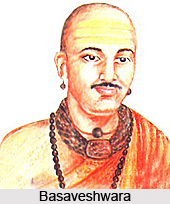 Basaveshwara is always remembered as a revolutionary saint in India, who gave the lesson that the right conduct is heaven and also preached that work is worship. Basaveshwara was very famous among the masses for teaching the ideals of simple living and the equality of all men.
Basaveshwara is always remembered as a revolutionary saint in India, who gave the lesson that the right conduct is heaven and also preached that work is worship. Basaveshwara was very famous among the masses for teaching the ideals of simple living and the equality of all men.
Basaveshwara born in the village of Bagewadi at Bijapur District in Karnataka, in the year of 1131 and his family was well known in the society as a very religious family. The family Guru of Basaveshwara, Madarasa, once predicted that Basaveshwara was not an ordinary baby and Nandi (Vrishabha) himself has been born as Basaveshwara, by the grace of Lord Shiva. Basaveshwara started his education under the guidance of Madarasa and soon he began feeling the presence of God everywhere and in all things.
Basaveshwara started to find the presence of God in almost everything like in the image of Sangameshwara and also all over the world and he keenly studied all the branches of learning. He spread easily comprehensible and pragmatic philosophies throughout his entire life and he said that there is only one God. He felt that compassion is the main root of all the religions and he taught his descendants to treat all the living beings with kindness. He hated the idea of living for selfish and personal interests and Basaveshwara always believed that everyone should take up a fair and honest means of livelihood. Basaveshwara left the mundane world in the year of 1167.
This article is a stub. You can enrich by adding more information to it. Send your Write Up to content@indianetzone.com









